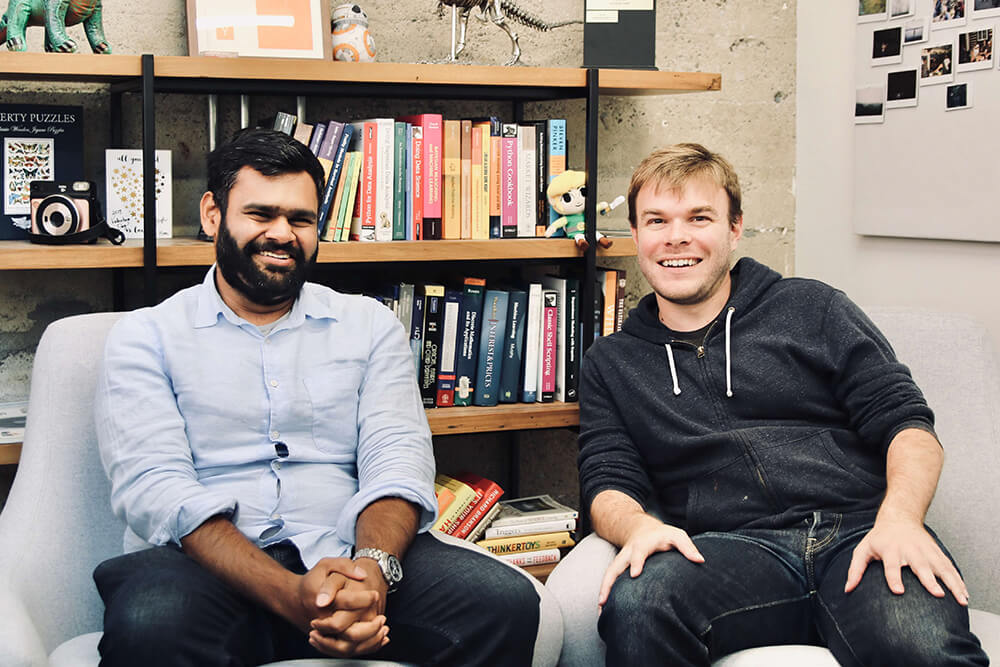
Lending Data to Loans
Alumni fuse technology and finance to make investing smarter and safer
At 22 years old, Hugh Edmundson took a risk he wasn’t sure would pay off. He left his first post-graduate job as a trader at Morgan Stanley, moved to San Francisco and convinced his fellow computational finance classmate Abeer Agrawal to start their own company.
Five years later that company, Theorem, manages over $1 billion in assets for a variety of clients. It’s safe to say that the risk is paying off.
Theorem is an investment management and technology company rolled into one — the company uses data science, machine learning and software engineering to invest in marketplace lending loans.
In marketplace lending, investors back personal consumer loans — such as debt consolidation, business or home improvement loans. Replacing the traditional role of a bank, companies like Prosper and Lending Club help connect investors directly to consumers to fund these peer-to-peer loans.
In this process, investors generally see a handful of simple metrics such as FICO scores, income and the interest rate of the loan to determine buying a loan. On the other hand, the lenders — i.e. Prosper and Lending Club — look at upwards of hundreds of different factors when pricing a loan.
“There’s a huge information asymmetry between the originator of the loan and the person who is actually bearing the risk and buying the loan,” said Edmundson. This asymmetry could lead to a problem if loan lenders over-originate loans or originate lower quality loans.
In coming up with the idea for Theorem, Edmundson saw an opportunity to move from understanding risk at the portfolio level (what investors see) to the loan level (what lenders see), but there was one missing piece — an ability to consider the multitude of factors that go into originating loans.
Enter Abeer Agrawal, Theorem’s chief technology officer. Agrawal, who studied computational finance and electric and computer engineering at Carnegie Mellon, began his professional career at Google and then as a founding employee at an early stage startup, MobileSpan, which helped businesses access and secure their content on mobile devices.
Coincidentally, around the time the company was acquired by Dropbox, Edmundson and Agrawal had reconnected.
In 2014, the pair joined Y Combinator, a seed accelerator that has helped launch companies such as Dropbox, Airbnb and Reddit. As part of the program, selected startups spend three months in Silicon Valley developing their company and preparing their pitch to investors.
With seed funding from Y Combinator and an investment fund of $50,000, from names such as Ron Conway and Max Levchin, Edmundson and Agrawal hit the ground running to build their company.
They started by hiring the best quantitative talent they could find. “We are a tech start-up more than anything else,” said Agrawal. “Most of our team is engineers and researchers, and we are essentially using algorithms and machine learning to optimize the data and make our decisions.”
What Theorem essentially does is fact-check marketplace lending loans through their own underwriting models to evaluate the pricing of loans and quality of investment for clients.
Their loan scoring technology analyzes more than 1,000 data points to identify the best loans, reduce default rates and build strong, diversified portfolios for their clients.
To prove their models work, Edmundson says, the company had to play high stakes show-and-tell by buying a bunch of loans and letting them ride for 18-24 months. One of the hardest challenges was building that institutional credibility. But, in just under two years, the company secured their first institutional client, a large university endowment, and within three years reached their first $100 million in assets.
As their clients and assets grew, so did the company’s talent. In the last 18 months, Theorem has grown from a team of six to a team of over 30.
“We are the least smart people at the company,” said Agrawal. He credits the quality of their team and the culture their team has built with Theorem’s continued success.
“We’re still hiring!” added Edmundson. Edmundson and Agrawal encourage anyone interested in what Theorem does to take a look at their careers page.

